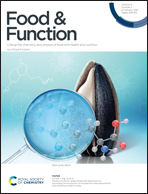Fermented ginseng attenuates lipopolysaccharide-induced inflammatory responses by activating the TLR4/MAPK signaling pathway and remediating gut barrier†
Abstract
Generally, ginsenosides have the physiological effect of an anti-inflammatory immunity. After fermentation, the types of ginsenosides in ginseng change, and their physiological activity becomes a concern. L. plantarum KP-4 screened from Korean kimchi were used to ferment ginseng, and the changes of ginsenosides were observed. C57BL/6N mice were treated using fermented ginseng (390 mg kg−1 day−1), which was mixed with normal food, and an inflammatory mice model was established by the intraperitoneal injection of lipopolysaccharide (LPS) (2.5 mg per kg body weight) four weeks later. The liver index, pathological index, biochemical index, and inflammatory signaling pathway were determined. The results demonstrated that L. plantarum KP-4 fermentation increased the content of minor ginsenosides in ginseng and decreased the content of major ginsenosides. Fermented ginseng significantly reduced LPS-induced increases in ALT, AST, and pro-inflammatory cytokines IL-6, TNF-α, and IL-1β in mice. Supplementation with fermented ginseng significantly ameliorated LPS-induced overexpression of Toll-like receptor 4 (TLR4), caspase3, phosphorylation p38 mitogen-activated protein kinase (p38MAPK), and phosphorylation extracellular signal-regulated kinase (ERK) compared with the control group. Moreover, fermented ginseng significantly increased the expression of claudin 1, the intestinal tight junction protein, caused by LPS. In conclusion, fermented ginseng alleviates LPS-induced inflammation through the TLR4/MAPK signaling pathway and increased intestinal barrier function in mice.



 Please wait while we load your content...
Please wait while we load your content...